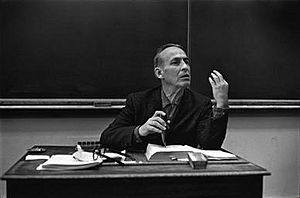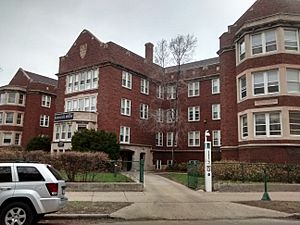Norman Maclean facts for kids
Quick facts for kids
Norman Fitzroy Maclean
|
|
|---|---|

Maclean in 1970
|
|
| Born | December 23, 1902 Clarinda, Iowa, U.S. |
| Died | August 2, 1990 (aged 87) Chicago, Illinois, U.S. |
| Occupation | Author Professor of English literature |
| Alma mater | Dartmouth College University of Chicago |
| Genre | Nature, fishing, outdoors, biography |
| Notable works | A River Runs Through It (1976) Young Men and Fire (1992) |
| Spouse | Jessie Burns (1925–1968) |
| Children | 2, including John Maclean |
| Parents | John and Clara Maclean |
Norman Fitzroy Maclean (December 23, 1902 – August 2, 1990) was an American writer and professor. He taught English literature at the University of Chicago for many years. After he retired, he became a famous author. Maclean is best known for his collection of stories A River Runs Through It and Other Stories (1976) and the non-fiction book Young Men and Fire (1992). His writing style is often compared to Ernest Hemingway's.
Contents
Maclean's Family History
Norman Maclean's family came from Scotland. His ancestors were Presbyterians who spoke Scottish Gaelic. They lived on the Isle of Coll, near the Isle of Mull.
In 1821, Maclean's great-grandfather, Laughlan Maclean, moved with his wife to Cape Breton, Nova Scotia, in Canada. They later settled in Pictou County.
Maclean's father, Rev. John Norman Maclean, was born in Nova Scotia in 1862. He was very smart and studied to become a minister. He met Maclean's mother, Clara Davidson, in Manitoba, Canada. She was a schoolteacher. They married in 1893.
Norman Maclean's Life Story
Early Life and Education
Norman Maclean was born in Clarinda, Iowa, on December 23, 1902. His parents were Clara Evelyn and Rev. John Norman Maclean. Norman and his younger brother, Paul Davidson MacLean, were taught at home by their father until 1913.
Maclean remembered that his father often read aloud to them from the Bible and religious poems. This helped him love the rhythm of language. His father also taught both sons how to fly fish.
In 1909, his family moved to Missoula, Montana. The years he spent there greatly influenced his writing. These experiences appear in his stories like The Woods, Books, and Truant Officers and A River Runs Through It and Other Stories.
Working in the Forest Service
When Maclean was 14, he worked for the United States Forest Service in the Bitterroot National Forest in Montana. His experiences there inspired stories like USFS 1919: The Ranger, the Cook, and a Hole in the Sky and "Black Ghost" in Young Men and Fire.
College Years at Dartmouth
Maclean later attended Dartmouth College. He was the editor-in-chief of the college's humor magazine. The famous children's author Dr. Seuss took over his role as editor. Maclean called Dr. Seuss "the craziest guy I ever met."
Maclean was very grateful for the creative writing classes taught by the poet Robert Frost at Dartmouth. He learned a lot from Frost. He also began to admire the writing style of Ernest Hemingway during this time.
Maclean earned his Bachelor of Arts degree in 1924. He stayed at Dartmouth as an instructor until 1926.
Personal Life and Family
Maclean met his future wife, Jessie Burns, at a party in Montana. They married on September 24, 1931. They had two children: a daughter named Jean (born in 1942) and a son named John Norman Maclean (born in 1943). John later became a journalist and author.
Jessie was very friendly and made many friends at the University of Chicago. Maclean said she helped him love Chicago, showing him its "geometric and industrial and architectural beauty." Jessie passed away in 1968.
The Maclean family lived two different lives each year. During the summers, they stayed at a log cabin built by Maclean's father near Seeley Lake, Montana. The rest of the year, they lived in Chicago for the academic year.
The Loss of Paul MacLean
Maclean's younger brother, Paul Davidson MacLean, also graduated from Dartmouth. Paul became a well-known journalist who reported on political problems in Montana. He later worked with Norman and Jessie at the University of Chicago.
Sadly, Paul was found dead on May 2, 1938.
Norman Maclean traveled with his brother's casket back to Montana. After the funeral, he spent several weeks with his parents at their cabin. Maclean's father was very sad and wondered what had happened to Paul. He told Norman, "After you have finished your true stories sometime, why don't you make up a story and the people to go with it? Only then will you understand what happened and why." This advice later influenced Maclean's writing.
Teaching at the University of Chicago
Maclean began his advanced studies in English at the University of Chicago in 1928 and earned his PhD in 1940.
He became known for making difficult authors like François Rabelais and Geoffrey Chaucer exciting in his classes. Students loved his lectures. One student said, "His classes were always overrun." Another student, the poet Marie Borroff, said Maclean was unique because he came from a "wilderness outpost" and was skilled with a rifle.
During World War II, Maclean served as the dean of students at the university. He also helped write a manual on military maps and aerial photographs.
Maclean eventually became a highly respected professor in the English Department. He taught about poets from the Romantic era and Shakespeare. U.S. Supreme Court Justice John Paul Stevens took a poetry class with Maclean and called him "the teacher to whom I am most indebted."
Retirement and Writing Career
After retiring in 1973, Maclean started writing down the stories he loved to tell. His children, Jean and John, had often encouraged him to do this.
Following his father's advice, Maclean wrote a famous story about his relationship with his parents and, especially, with his brother Paul. This story became the novella A River Runs Through It and Other Stories. His son, John, said this book gave Paul "a lasting afterlife as the charming rebel."
The book also included another story about Maclean's teenage work with the U.S. Forest Service, called "USFS 1919: The Ranger, the Cook, and a Hole in the Sky." In 1976, A River Runs Through It and Other Stories was the first fiction book ever published by the University of Chicago Press. It received great reviews and was even nominated for the Pulitzer Prize.
While A River Runs Through It was being published, Maclean began researching a book about 13 smokejumpers who died fighting the 1949 Mann Gulch Forest Fire. This book was published after his death in 1992 as Young Men and Fire. It won the National Book Critics Circle Award.
Later Years and Death
In his last years, Maclean worked on turning A River Runs Through It into a movie script. He also tried to finish Young Men and Fire as his health declined.
Norman Maclean passed away in Chicago on August 2, 1990, at the age of 87. He left Young Men and Fire unfinished. As he wished, his body was cremated, and his ashes were scattered over the mountains of Montana.
Maclean's Legacy
In 1991, a building on the University of Chicago campus was named Maclean House in his honor. It was an undergraduate dormitory.
In 2008, the University of Chicago Press published The Norman Maclean Reader. This book included some of his unpublished writings, like parts of a book he never finished about George Armstrong Custer and the Battle of the Little Bighorn. This collection gave new insights into Maclean's remarkable writing career.
Literary Works
Books
- 1940: The Theory of Lyric Poetry from the Renaissance to Coleridge
- 1943: A Manual of Instruction in Military Maps and Aerial Photographs (with Everett C. Olson)
- 1976: A River Runs Through It and Other Stories (Illustrated by Barry Moser in 1989)
- 1992: Young Men and Fire
Articles and Essays
- 1952: Two essays—(1) "From Action to Image: Theories of the Lyric in the Eighteenth Century" and (2) "Episode, Scene, Speech, and Word: The Madness of Lear" —in R.S. Crane's Critics and Criticism: Ancient and Modern
- 1956: "Personification But Not Poetry" in ELH: English Literary History Vol. 23, No. 2 (Jun., 1956), pp. 163–170.
Edited Works
- 1988: Norman Maclean (edited by Ron McFarland and Hugh Nichols)
- 2008: The Norman Maclean Reader (edited by O. Alan Weltzien)


